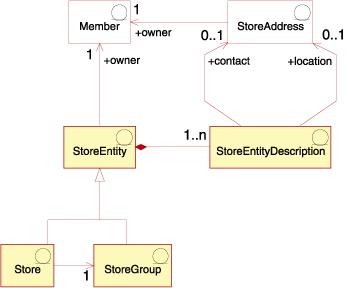Store data assets
A package of stores. In HCL Commerce an online store is the place
where all transactions for your online business occur. HCL Commerce supports several
different types of entities that are defined as stores. These store types include customer-facing
store, asset store, and proxy store.To create a store in HCL Commerce, you
must first create in the database: the store; the group to which it belongs; the abstract store
entity object that dually represents a store or store group.
The following diagram illustrates the store assets in the Transaction server.

- Store entity
- A store entity is an abstract superclass that can represent either a store or a store group. A store entity has one owner (a member).
- Store entity description
- The store entity description describes the store entity. A store entity can include a description. If your store supports multiple languages, the store entity description can be in multiple languages. The description can include a contact address for the store entity, and a location address for the store entity.
- Store
- A store is a store entity. A store must belong to a store group.
- Store group
- A store group is a collection of stores. A store group is a store entity. The
store group acts as a container for common information. This information can be stored at a store
group level and shared by all the stores in the store group. For example, stores in the same store
group can share information such as tax categories, supported languages, supported currencies,
calculation codes, and shipping jurisdictions.
Currently, only one store group can exist and be maintained at the site administration level within a Transaction server.
- Member
- A person, group, or organization that is known to the system. A member can be a user, an
organization, an organization unit, or a member group. A member can act as a customer or an
administrator, or can own entities.
 A member must first become a member of
the marketplace before the member can become a user.
A member must first become a member of
the marketplace before the member can become a user.
- Store address
- A store address is a store address. The address can include contacts and location. A store address has one, and only one, owner which is a Member.